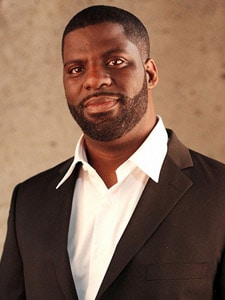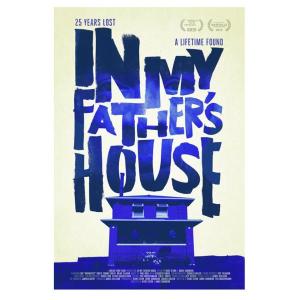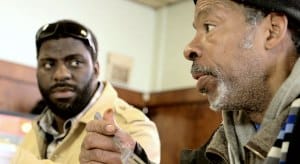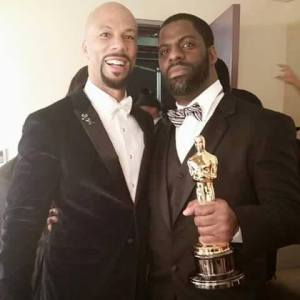Che "Rhymefest" Smith: Rebuilding His Father’s House (Interview)
 Che Smith, aka Rhymefest, is a Grammy and Oscar-winning hip-hop artist and songwriter. He is also the driving force behind the documentary In My Father’s House.
Che Smith, aka Rhymefest, is a Grammy and Oscar-winning hip-hop artist and songwriter. He is also the driving force behind the documentary In My Father’s House.
The film finds Rhymefest on the Chicago’s South Side, where he and his family buy a house that turns out to be the childhood home of his father. Che hasn’t had contact with his dad for over 20 years and living in the house inspires him to track down his father, who, it turns out is living on the streets, a homeless alcoholic, just around the corner. The film follows the journey of Che, his father and his family as they try to reconnect and deal with issues of homelessness, addiction and parental responsibility. The 13th Floor’s Marty Duda spoke with Rhymefest about how the film was made and how it affected his life and those around him. You can listen to the interview with Rhymefest here:
Or read a transcription of the interview here:
MD: When did you decide to make a film and to have a film be made about the events surrounding reconnecting with your father?
CS: Well the thing is this, I’m an artist and as an artist I once read something that said, you don’t have a life that’s worth living unless that life is documented, so that in the history of the world people know you existed.
MD: Right.
CS: So as an artist I’ve always been documenting through music. Some people document through having a journal. But now we live in the future where you can document your life through film. You can document your life through visual, like actually being there. So I don’t know if it was that I set off deciding to make a film…the first thing is I decided that I wanted to buy the house that my father grew up in and the second thing I decided that, that wasn’t enough, I wanted to know where I came from and what these spirits were in the house that were haunting me and making me uncomfortable and I just decided on that journey, it had to be documented. It wasn’t for commercial reasons, it was for reasons of, man, my children need to know that story. It turned into a film.
MD: Right. At some point you brought in the directors, Ricki Stern and Anne Sundberg then suddenly it must have changed into something else other than just a personal thing where you…
 CS: Like I said turned into a film. If you look at the first 20 minutes of the movie, I was shooting it on my iPad and iPhone and at that point a friend of mine in California said, ‘hey I know these people that really do documentaries, Ricki and Anne’. And he got me in contact with them, I sent them some of the footage, and they were in Chicago the next week filming.
CS: Like I said turned into a film. If you look at the first 20 minutes of the movie, I was shooting it on my iPad and iPhone and at that point a friend of mine in California said, ‘hey I know these people that really do documentaries, Ricki and Anne’. And he got me in contact with them, I sent them some of the footage, and they were in Chicago the next week filming.
MD: How did you pitch the idea to them?
CS: I kind of wanted to get away from some of the ideas like ‘pitching ideas’ this is not a commercial journey where I pitched it. I just basically told them the story. I just told them this is something that I’m filming and I’m trying to find my, well I’m trying to, I found my father and I’m trying to reconnect with him. The reason Ricki and Anne are necessary parts of this journey or this film is because they are able to tell the story in a way that I wouldn’t be able to and that’s being unbiased.
MD: Yeah.
CS: There are things in this film that have to do with me as a father that I had to look and say if I did it myself maybe I’ll ??? do you know what I mean?
MD: Yeah.
CS: And so what I love about Ricki and Anne is that they pose it in a real unbiased honest way that I don’t think I could have done myself.
MD: Was there much communication between you and them about what was going to be in the film after the process began?
CS: No. I think that, that makes it biased, right. So if we’re communicating about what’s going to be in there, what’s not going to be in there, that means I have editorial, you know, say so.
MD: Right.
CS: And I don’t think that, that would be healthy for as honest of a story as this is.
MD: Yeah. I assume that because you’re used to documenting your life so often anyway that the idea of cameras being around wasn’t as intrusive as say just your average person or maybe because of the world we live in today, having cameras around is just a normal thing, I don’t know. Was it an intrusion to have this crew around shooting all the time?
CS: There were different dynamics to this because this wasn’t something where Rhymefest was going in as an artist creating an album and nobody had to be there but me, the engineer and the producer. With this, this had to do, I mean my father had been homeless for 27 years, he wasn’t used to having cameras around him.
MD: Yeah.
CS: My wife wasn’t used to that, my children weren’t and even the community at large that we had to traverse through didn’t understand why there were cameras following us around.
MD: Yeah.
CS: So this was something that I, it wasn’t just about my comfortability with cameras, it was about me trying to get everyone else to be comfortable with the idea that you just have to keep moving and be normal and everything’s okay. Hopefully you saw the movie when it pans out, I mean nobody was acting, you know what I mean, everyone was living their life and after a while the cameras have a way of kind of melting it to the background. After a while you don’t even notice them.
MD: Yeah and there seemed to be points in the film where your father was addressing the camera directly as well. So obviously he kind of used it as a sounding board or…
CS: As a journal, yeah.
MD: Yeah. Was that something that the directors wanted to make happen as the film progressed?
CS: I can’t speak to that, I think Anne and Ricki would have to speak to their, what they were going for with that. I mean, I think the question then becomes does it work, does it pan out, does it make the film better to kind of understand his mind-set through certain experiences and I definitely thought it did.
MD: Yeah, definitely. Were you concerned about putting your personal life out there and did you have to…talking to your family quite a bit about it?
CS: No. I think vulnerability and fragility is what makes societies move forward. Someone has to be vulnerable enough to tell a story. So if you look at the Bible, the Bible is really nothing but a big story that we take antidotes from to learn how to move forward and I believe, like I said once again, the story of people’s lives are what we use in the future to help us navigate our lives and this is one story.
MD: Right and it seems that once the film got under way, you ended up taking on some pretty big issues in addition to the whole situation of absent fathers, there is then the homeless and the problem of alcoholism as well. Were you prepared to be dealing with these things in such a major way?
CS: No, no. I don’t think that when we talk about addiction because addiction is a disease, alcoholism, drug addiction, all that stuff. I don’t think that this is something that anyone can prepare for, that any family can prepare for. It shows us that things in life kind of tend to happen and you have to be strong enough and courageous enough to deal with them.
MD: Yeah. So do you think that making a film like this is having an effect on dealing with these problems at all?
CS: Well I hope that it is. We plan to try to create a curriculum and get this film into the prisons and detention centres and churches and definitely try to have an effect on the society around us and people who are in my situation. I hope that it will. I mean the feedback, I mean we’ve been getting incredible feedback from people who have been going through incredible situations. One thing in the movie it says that my situation is not unique and it’s not unique.
MD: And you mentioned feedback. One of the scenes I found most interesting in the film was when you had your father on the radio program that you were hosting and I was wondering, how much you involved that radio program in the whole process and how much it affected the outcome of everything. People seem to be pretty blunt in their calls in to, their opinions about what your father had done and just the whole situation.
CS: I mean the radio show that I did was just a piece of my father coming into the life that I was already living and the people that I was already dealing with on a weekly basis when I did that show. The show itself, I don’t believe, was a big piece as much as my father entering my world and what people in my world thought. You know, my father was homeless for 27 years, he didn’t know how people felt about deadbeat dads. I mean he was just doing enough to live every day, you know what I mean.
MD: Right, yeah.
 CS: To try to survive. So now he’s In a situation where he has a place to stay, he has food to eat and now he has to deal with people’s opinions.
CS: To try to survive. So now he’s In a situation where he has a place to stay, he has food to eat and now he has to deal with people’s opinions.
MD: Yeah.
CS: And he had to deal with my opinion. And I think that, that’s part of the new world that he lives in. You know, when you’re homeless you don’t deal in the world of people’s opinion.
MD: Yeah. That’s pretty much just dealing from moment to moment with surviving I guess, rather than these kind of abstract things that you don’t even think about….
CS: It may not even matter.
MD: Yeah.
CS: At the end of the day.
MD: Well now that the film is out. I assume that people are going to be pretty curious about your ongoing progress, about your life. They’re going to be wondering what’s going on. Is that a problem for you? Are you concerned that suddenly your life is kind of public property?
CS: No man. It’s like you want it. My wife said it best. She said she believes that our lives should be an open book and I think that with our lives being an open book, man that makes you an example, that makes you a role model, that makes people either cheer you on you know or help try to give you advice.
MD: Right.
CS: I’m open to world, man. I’m open to what the world has to offer.
MD: How would you say the experience of making this film has changed you and your family?
CS: Well for me personally, it has given me completion. I know who I am, I know where I come from, you know what I’m saying. Like I know that my father, my wit, my humour, my compassion for people comes from my father, my confidence, my resilience comes from my mother, like it helps to know that and not to feel like you’re detached from past and there’s a weakness because you don’t know where it comes from because you see people on your mother’s side that are just tough and resilient. And so, for my family, man, my children have discovered a grandfather.
MD: Right.
CS: Which is incredible.
MD: Yeah.
CS: My wife gets to live with a ??? I mean it’s improved the quality of the life of my family.
MD: Yeah. I assume your father has seen the film. What was his reaction to it?
CS: The first thing my father said after he saw the movie is, ‘Was that me? Did I look that bad? Oh my God I look horrible!’ I said yeah, that’s what homeless people look like.
MD: Right.
CS: That was his first reaction, but he loved the movie, he loved the film. He’s happy to see himself transform. One thing he said, ‘man you’re a different guy than you were a year ago’, that’s another thing to show you.
MD: It’s got to be mind blowing to see that happen over the course of 90 minutes or so. I can’t imagine what he… and your own career seems to have transformed as well. During the film it seems like your music career was kind of on the back burner, I mean you were in the studio doing things but you’ve been kind of out of the mainstream for a while. Suddenly here you are with Glory from Selma in the Academy Awards. How did that happen? Hhow did you get back into the swing of things?
 CS: I’d always been working with Kanye, I’ve always been working with Common and it was just an opportunity, it had nothing to do with the movie, where Common just called me and said look I’m working on a song for a movie would you like to help me, I said yeah and next thing you know I got a Oscar!
CS: I’d always been working with Kanye, I’ve always been working with Common and it was just an opportunity, it had nothing to do with the movie, where Common just called me and said look I’m working on a song for a movie would you like to help me, I said yeah and next thing you know I got a Oscar!
MD: It’s as easy as that, that’s amazing.
CS: It’s as easy as 1,2,3. But I do think this, look, what I will say although I had nothing to do with the filming of the movie, it had everything to do with the experience of finding my father. I may not have been open to doing that with him.
MD: Right.
CS: You know what I mean. So it’s something about completion. The less you say yes the more things you say no to and it leads you to higher success.
MD: Gotcha. Yeah and the premiere of the film was at Tribeca last month, is that right?
CS: Yeah.
MD: So what was that experience like? What was the reaction to the audience and how many of you went to the film? Was it a kind of celebration type of thing for you guys?
CS: My whole family went just to see what people laugh at, to see where people cry, to see what people were frustrated. It was interesting to see people react to your life.
MD: I can’t imagine what it must be like to be sitting in an audience watching people watch your own life kind of unfold in front of you, so…
CS: and then you watch…look, I had to sit and watch me, I had to sit and watch my wife cry in front of a room full of people.
MD: Yeah.
CS: I have to sit and watch me be an asshole sometimes. I have to watch me beat up on my father in the studio or like… I watched my rises and my falls and my goods and my bads and I learned a lot about me through watching other people react to me;
MD: Yeah. So what is happening next with you? it seems like, I assume you’re still in the same house. I assume that this kind of boost in your career is kind of put you back in touch with what’s going on. What are your plans?
CS: I’m working on an album right now, called Pieces and Pieces is an album that is about when everything falls apart and you’re trying to put it back together, whether it’s your career, whether it’s your family life, your personal-self. I need to put the pieces back together and that’s the album that I’m working on currently.
MD: Yeah.
CS: On this album of course we have Kanye, Common, Lupe. I even have a song with Jesse Jackson.
MD: Oh really?
CS: Yeah. He’s rapping, it’s pretty good.
MD: Well he’s been rapping for years actually if you listen to his speeches.
CS: Yeah. He’s the original rapper. I’m excited about this new album, I’m excited about, I met Kenneth Cole, the clothing designer, Kenneth Cole actually came out to the film at Tribeca and liked it so much he asked me to be one of his models.
MD: Excellent.
CS: So I’ve been doing some modelling work for Kenneth Cole, who would know.
MD: That’s crazy.
CS: Who would’ve thought it?
MD: Well life is full of surprises, that’s for sure.
CS: That’s for sure. I thought I was ugly. If you put anybody in a suit they look a little better.
MD: Right. I guess that’s why fashion is so popular.
CS: Yeah, right.
MD: Well it’s great that things have worked out the way they have. I mean from judging from the beginning of the film and the way things were there to where they are now, it’s just incredible how the power of what you decided to do and then combining it with the making of the film is accomplished. I guess it kind of stands as a testament for other people to get inspired by. So good on ya.
CS: Well what I hope is that, my wish for is that people down in…you’re in New Zealand is that correct?
MD: That’s right, yeah.
CS: The people in New Zealand watch this who who of a film. I hope that they enjoy it and watch? It and that even across the world someone can gain something to help them in their own lives and help them forgive.
In My Father’s House is playing now at the New Zealand Documentary Edge Festival
- Challengers – Dir: Luca Guadagnino (Film Review) - April 24, 2024
- Civil War – Dir: Alex Garland (Film Review) - April 9, 2024
- Pearl Jam – Dark Matter (Monkeywrench/Republic) Album Review - April 1, 2024
